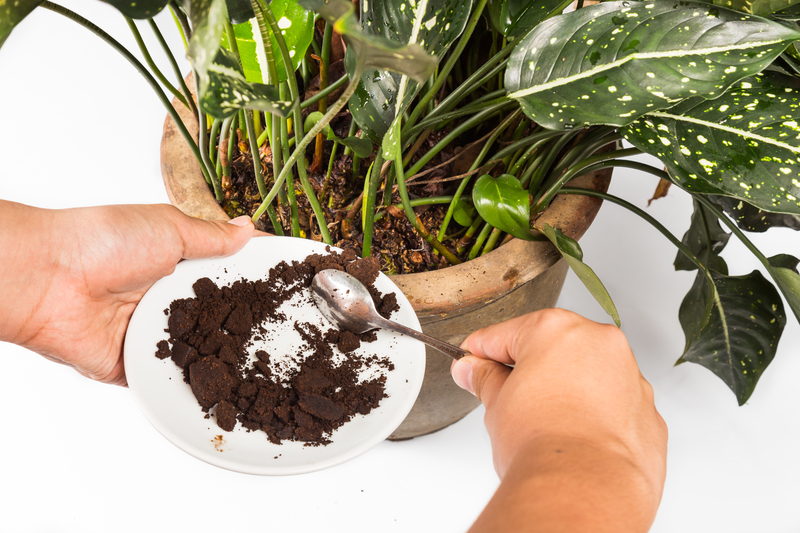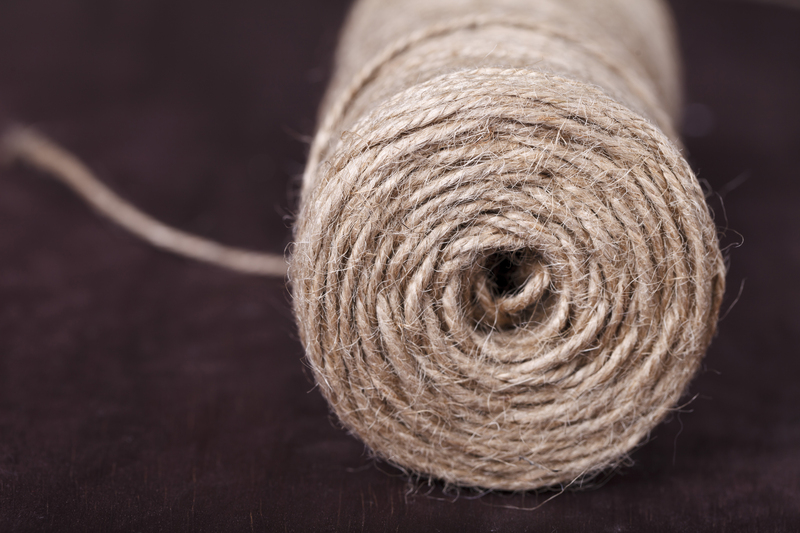Eco-friendly Ways to Establish a Flourishing Herb Garden
Posted on 06/06/2025
Eco-friendly Ways to Establish a Flourishing Herb Garden
Fresh herbs elevate culinary dishes and fill your home with invigorating fragrances. However, establishing a flourishing herb garden need not compromise the environment. Adopting eco-friendly practices encourages biodiversity, conserves resources, and ensures your herbs are as healthy and delicious as possible. Below, you'll find comprehensive steps and tips for creating a sustainable herb garden that will thrive year after year.

Why Grow a Sustainable Herb Garden?
Growing herbs sustainably brings numerous benefits:
- Reduces your carbon footprint by cutting transportation emissions from store-bought herbs.
- Eliminates chemical exposure for your family, soil, and garden ecosystem.
- Encourages biodiversity and supports pollinator populations such as bees and butterflies.
- Decreases waste through composting and reusable materials.
- Promotes water conservation and healthier soil structures.
Understanding the Basics: Which Herbs Flourish Organically?
Before you plant, consider which herbs will flourish naturally in your local climate and soil. Some of the easiest and most sustainable herbs to grow include:
- Basil: Loves warmth and lots of sun.
- Mint: Vigorous, but best kept in containers to prevent spreading.
- Rosemary: Thrives in dry, well-drained soil.
- Parsley: Cool-weather herb, grows well in partial shade.
- Oregano: Drought-tolerant and hardy.
- Thyme: Prefers sandy, well-drained soils.
- Cilantro: Grows quickly in cooler seasons.
Tip: Always research your local growing zones and select herbs that are well-adapted to your region for the greatest success and the smallest environmental impact.
Eco-friendly Steps to Creating a Flourishing Herb Garden
1. Choose the Right Location and Design
Start by selecting a spot that receives at least 6 hours of sunlight each day. Good drainage and air circulation are also key. Consider these tips when planning your sustainable herb garden:
- Near the kitchen: Plant herbs close to your kitchen for easy access and fewer trips outside, reducing disturbance to the garden ecosystem.
- Companion planting: Arrange herbs to complement one another's growth and repel pests (for example, plant basil and tomatoes together).
- Raised beds or containers: Use repurposed wood or recycled containers for a more sustainable setup. Containers also help control aggressive herbs like mint.
2. Use Organic Soil and Compost
Healthy soil is the foundation of a thriving eco-friendly herb garden. Avoid chemical fertilizers and instead enrich your garden with:
- Homemade compost: Kitchen scraps, coffee grounds, eggshells, and plant trimmings create nutrient-dense compost for herbs.
- Natural amendments: Add worm castings, aged manure, or leaf mold to improve soil structure, water retention, and fertility.
- Mulching: Organic mulches like straw, grass clippings, or shredded leaves reduce weeds and retain moisture.
3. Start Seeds Sustainably
Minimize your environmental impact by starting herbs from seed. This avoids the plastic waste associated with nursery-bought seedlings and allows more variety. For eco-friendly seed starting:
- Use biodegradable pots: Try newspaper pots, toilet paper rolls, or peat-free coconut coir starters.
- Save your own seeds: Let some of your herbs flower and collect seeds for the next planting season.
- Source organic, non-GMO seeds: Choose reputable suppliers committed to sustainable practices.
4. Water Conservation Techniques
Eco-friendly herb gardening means using water wisely. Over-watering harms plants and wastes resources. Try these water-saving methods:
- Mulch deeply: Reduces evaporation and keeps roots cool.
- Install a rain barrel: Collect rainwater for irrigation, reducing reliance on municipal water.
- Drip irrigation: Slow-drip systems deliver water directly to plant roots, minimizing waste.
- Water at dawn or dusk: Lower temperatures mean less evaporation and healthier plants.
5. Natural Pest Management
Say goodbye to chemical pesticides with these safe and sustainable alternatives:
- Attract beneficial insects: Include flowering plants that lure ladybugs, lacewings, and predatory wasps.
- Row covers: Lightweight fabric protects young herbs from pests while allowing sunlight and water through.
- Companion planting: Interplanting basil, chives, or marigolds help deter unwanted bugs.
- Homemade sprays: Use diluted soap, garlic, or neem oil to target soft-bodied pests without harming the environment.
6. Encourage Biodiversity
A balanced, diverse garden is more resilient to disease and pests. Promote biodiversity by:
- Planting a range of herbs: Vary heights, colors, and scents to bring in a wider variety of pollinators.
- Adding native plants: Incorporate local wildflowers and grasses to attract beneficial wildlife.
- Providing habitats: Use logs, stones, and small water features to shelter insects, birds, and amphibians.
- Avoiding monocultures: Don't plant too many of the same herb in one area, as it can encourage pests and disease.
7. Use Recycled and Sustainable Materials
Make your eco-friendly herb garden even greener:
- Repurpose containers: Old buckets, crates, or pallets get new life as herb planters.
- Choose tools made from sustainable materials: Look for bamboo handles or recycled steel trowels.
- Reuse stakes and trellises: Collect sticks, branches, or old furniture frames for plant supports.
- Avoid single-use plastics: Opt for long-lasting, biodegradable, or recyclable alternatives whenever possible.
8. Compost Kitchen and Garden Waste
Composting is key to keeping your herb garden nutrient-rich and sustainable. Here's how to start:
- Set up a dedicated compost bin: Place it near your garden for easy additions and access.
- Balance green and brown material: Combine kitchen scraps (greens) with leaves or shredded paper (browns).
- Turn regularly: Mixing speeds up decomposition and prevents odors.
- Harvest finished compost: Apply it to your herbs each season to boost health and yield.

Maximize Your Sustainable Herb Garden's Potential
Harvesting Eco-consciously
Respectful harvesting technique ensures your herb plants remain productive and healthy. Follow these guidelines:
- Only take what you need: Leave at least two-thirds of the plant intact so it can regrow quickly.
- Harvest in the morning: Oils and flavor are most concentrated right after the dew lifts.
- Avoid harsh chemicals: Rinse herbs in cool water rather than chemical washes.
- Use sharp, clean scissors: Causes less damage and reduces the risk of transmitting disease.
Preserving Herbs Sustainably
Extend your eco-friendly garden's bounty by drying, freezing, or creating herbal infusions. Here are some sustainable preservation methods:
- Natural air drying: Tie small bunches of herbs and hang upside down in a dry, well-ventilated area.
- Dehydrator use: Electric dehydrators are energy-efficient and fast, but sun-drying on screens saves energy.
- Freezing in water or oil: Chop herbs and freeze in ice cube trays covered with water or olive oil for easy portioning.
- Homemade vinegars and oils: Infuse clean, dry herbs into vinegars or oils for unique flavors and gifts.
Seasonal Care for Sustainable Herb Gardens
To keep your sustainable herb garden thriving through each season:
- Rotate crops annually: Prevents soil depletion and interrupts pest cycles.
- Replace mulch in spring and fall: Replenishes nutrients and readies the soil for new growth or winter rest.
- Let some plants flower: Supports pollinators and provides seeds for next year.
- Bring tender herbs indoors: Perennial herbs like rosemary or basil can overwinter on a sunny windowsill.
Conclusion: Grow Green, Harvest Abundantly
Adopting eco-friendly ways to establish a flourishing herb garden not only yields fresher flavors and vibrant greenery--it nurtures your local environment for future generations. By prioritizing organic practices, conserving resources, and encouraging biodiversity, you can create a sustainable oasis that will provide for both your table and the natural world. Whether you have a full backyard or just a sunny windowsill, growing herbs the green way is a rewarding step towards a healthier, greener lifestyle.
Start small, grow sustainably, and enjoy the beauty and bounty of your thriving eco-friendly herb garden!

